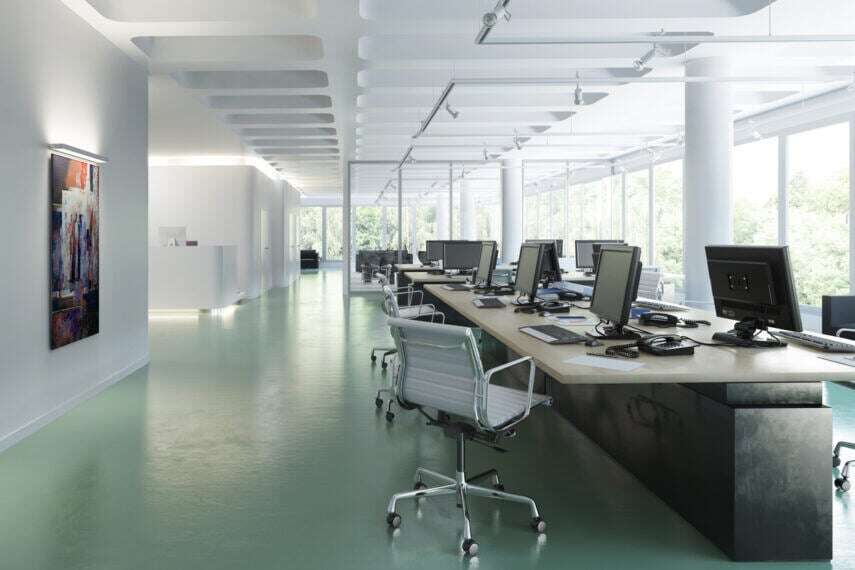The covid pandemic had a dramatic impact on the usage of office buildings in the UK and around the world. First with lockdowns and orders to work from home where possible and subsequently, with changes in working patterns which mean that offices are used less frequently.
As we return to the new normal following the pandemic, there are many considerations relating to the management and maintenance of office buildings.
In this article, we look at some of the plumbing considerations for property managers that have become even more relevant for offices since the pandemic. We also highlight some of the latest thinking and advice.
Unoccupied and less regularly used offices
When businesses or offices close operations for extended periods either as a result of intermittent use or lockdowns the office’s systems can develop issues that evolve to be hazardous especially if regular maintenance is neglected. For the plumbing system left unattended for a long time, the hazards include burst pipes, legionnaires bacteria in the water system and drying out of plumbing traps.

Burst pipes
The responsibility to maintain water pipes within the office premises is the responsibility of the property owner/manager [2]. Pipes are particularly vulnerable, for unused offices, in cold seasons and can often burst unless the following measures should be taken by the property manager, engineer or construction professional at the various level of property development/management.
Tanks insulation and lag pipes
When an office is abandoned for extended periods, pipe maintenance can be neglected. Neglecting the pipes, especially in cold seasons can cause pipe contractions and expansions causing a strain on the pipes, due to freezing and melting of the water in the pipes, eventually leading to pipe burst [3]. To prevent pipe bursts, the pipes should be properly lagged all through the entire plumbing paying close attention to curves and corners. Similarly, the water tank should be properly insulated from the cold to prevent cracking due to freezing. The lagging and insulation can be incorporated as part of the building plumbing-system or manually done on abandoned buildings.
Stopcock or valve and heating system
It is important to install/ locate the stopcock valve that can easily be accessed by both the office tenant and property manager which can be easily turned off when the office is abandoned especially for intermittently used offices [3]. Leaving the heating system on before closing down the office can keep the pipe warm and subsequently prevent the freezing of water in pipes which could lead to pipe bursts.
Checking for pipe bursts throughout the office before re-starting the use of unoccupied office space is important to prevent water damage or flooding as a result of leakages.
Drying out plumbing traps

Cause
When an office is unoccupied for a prolonged period, above 1 month, the water flow in the plumbing system is stopped and this can cause the plumbing traps (S-traps and P-traps) that prevent sewer gas from flowing back into the office space to dry up due to evaporation in high heat, mechanical damage (capillary action), etc [4].
Prevention and remedy
To keep the plumbing traps from drying, regular running of water through them is necessary which can be done by the property manager under the authority of the office owner or by the owner if available. However, during Covid-19 lockdowns, this could have been hard to achieve making Plumbing traps drying out inevitable and thus a remedy necessary on resumption to work. It is also the case with intermittently used offices that cannot be accessed in between the closures.
Dried up plumbing traps allow the release of foul-smelling sewer gas back into the office space causing discomfort on reopening of the office. Although fixing the issue is often easy and requires just opening the taps and letting the water run for approximately 2 minutes to allow the traps to refill, it is not advised to do so where the foul smell is suspicious as it may be toxic or flammable. Calling the plumbing services is the best course of action to prevent accidents and possible injuries or health issues arising from inhalation of the gases. The foul smells may linger in the room depending on how long the plumbing traps have been dry. After refilling the plumbing traps, it’s necessary to keep the office well ventilated to let in fresh air into the office by opening the window or air conditioning without recirculating the already contaminated indoor air. Waterless traps are an alternative that do not rely on water to create a barrier and therefore are not at risk of drying out.
Legionnaires bacteria in a water system
In offices that have; cooling systems and water outlets that create and spread breathable droplets, water heating systems or storage systems or water re-circulation systems, the risk of growth of legionella bacteria which causes Legionnaire’s disease is high and could be dangerous especial to people above 45 years, heavy drinkers and smokers and those with chronic ailments or impaired immunity [5]. The property manager needs to understand and manage the legionella risk and how to manage it especially when the tenants are intermittent office users or leave the office unoccupied for extended periods. To control the growth of legionella bacteria in unoccupied offices, the water systems and storage tanks should be drained out or kept at a temperature of about 60℃, and plumbing fittings that encourage growth should be avoided by using only appliances approved by the UK Water Regulations Advisory Scheme, water should be kept clean at all times and regularly treated and any stagnation points drained [5].

The innovative nature of the HepᵥO waterless valve makes is suitable for use as a problem solver, for instance, buildings with interim where water traps are prone to drying out or in recreational vehicles, where water traps are prone to losing their seal.
References

